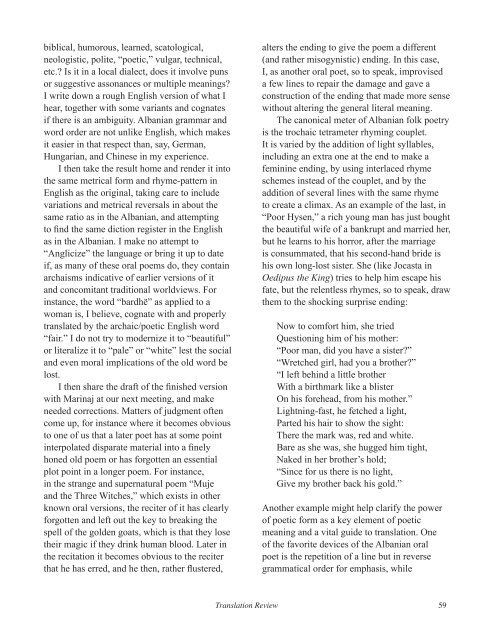Table of contents - The University of Texas at Dallas
Table of contents - The University of Texas at Dallas
Table of contents - The University of Texas at Dallas
You also want an ePaper? Increase the reach of your titles
YUMPU automatically turns print PDFs into web optimized ePapers that Google loves.
iblical, humorous, learned, sc<strong>at</strong>ological,<br />
neologistic, polite, “poetic,” vulgar, technical,<br />
etc. Is it in a local dialect, does it involve puns<br />
or suggestive assonances or multiple meanings<br />
I write down a rough English version <strong>of</strong> wh<strong>at</strong> I<br />
hear, together with some variants and cogn<strong>at</strong>es<br />
if there is an ambiguity. Albanian grammar and<br />
word order are not unlike English, which makes<br />
it easier in th<strong>at</strong> respect than, say, German,<br />
Hungarian, and Chinese in my experience.<br />
I then take the result home and render it into<br />
the same metrical form and rhyme-p<strong>at</strong>tern in<br />
English as the original, taking care to include<br />
vari<strong>at</strong>ions and metrical reversals in about the<br />
same r<strong>at</strong>io as in the Albanian, and <strong>at</strong>tempting<br />
to find the same diction register in the English<br />
as in the Albanian. I make no <strong>at</strong>tempt to<br />
“Anglicize” the language or bring it up to d<strong>at</strong>e<br />
if, as many <strong>of</strong> these oral poems do, they contain<br />
archaisms indic<strong>at</strong>ive <strong>of</strong> earlier versions <strong>of</strong> it<br />
and concomitant traditional worldviews. For<br />
instance, the word “bardhë” as applied to a<br />
woman is, I believe, cogn<strong>at</strong>e with and properly<br />
transl<strong>at</strong>ed by the archaic/poetic English word<br />
“fair.” I do not try to modernize it to “beautiful”<br />
or literalize it to “pale” or “white” lest the social<br />
and even moral implic<strong>at</strong>ions <strong>of</strong> the old word be<br />
lost.<br />
I then share the draft <strong>of</strong> the finished version<br />
with Marinaj <strong>at</strong> our next meeting, and make<br />
needed corrections. M<strong>at</strong>ters <strong>of</strong> judgment <strong>of</strong>ten<br />
come up, for instance where it becomes obvious<br />
to one <strong>of</strong> us th<strong>at</strong> a l<strong>at</strong>er poet has <strong>at</strong> some point<br />
interpol<strong>at</strong>ed dispar<strong>at</strong>e m<strong>at</strong>erial into a finely<br />
honed old poem or has forgotten an essential<br />
plot point in a longer poem. For instance,<br />
in the strange and supern<strong>at</strong>ural poem “Muje<br />
and the Three Witches,” which exists in other<br />
known oral versions, the reciter <strong>of</strong> it has clearly<br />
forgotten and left out the key to breaking the<br />
spell <strong>of</strong> the golden go<strong>at</strong>s, which is th<strong>at</strong> they lose<br />
their magic if they drink human blood. L<strong>at</strong>er in<br />
the recit<strong>at</strong>ion it becomes obvious to the reciter<br />
th<strong>at</strong> he has erred, and he then, r<strong>at</strong>her flustered,<br />
alters the ending to give the poem a different<br />
(and r<strong>at</strong>her misogynistic) ending. In this case,<br />
I, as another oral poet, so to speak, improvised<br />
a few lines to repair the damage and gave a<br />
construction <strong>of</strong> the ending th<strong>at</strong> made more sense<br />
without altering the general literal meaning.<br />
<strong>The</strong> canonical meter <strong>of</strong> Albanian folk poetry<br />
is the trochaic tetrameter rhyming couplet.<br />
It is varied by the addition <strong>of</strong> light syllables,<br />
including an extra one <strong>at</strong> the end to make a<br />
feminine ending, by using interlaced rhyme<br />
schemes instead <strong>of</strong> the couplet, and by the<br />
addition <strong>of</strong> several lines with the same rhyme<br />
to cre<strong>at</strong>e a climax. As an example <strong>of</strong> the last, in<br />
“Poor Hysen,” a rich young man has just bought<br />
the beautiful wife <strong>of</strong> a bankrupt and married her,<br />
but he learns to his horror, after the marriage<br />
is consumm<strong>at</strong>ed, th<strong>at</strong> his second-hand bride is<br />
his own long-lost sister. She (like Jocasta in<br />
Oedipus the King) tries to help him escape his<br />
f<strong>at</strong>e, but the relentless rhymes, so to speak, draw<br />
them to the shocking surprise ending:<br />
Now to comfort him, she tried<br />
Questioning him <strong>of</strong> his mother:<br />
“Poor man, did you have a sister”<br />
“Wretched girl, had you a brother”<br />
“I left behind a little brother<br />
With a birthmark like a blister<br />
On his forehead, from his mother.”<br />
Lightning-fast, he fetched a light,<br />
Parted his hair to show the sight:<br />
<strong>The</strong>re the mark was, red and white.<br />
Bare as she was, she hugged him tight,<br />
Naked in her brother’s hold;<br />
“Since for us there is no light,<br />
Give my brother back his gold.”<br />
Another example might help clarify the power<br />
<strong>of</strong> poetic form as a key element <strong>of</strong> poetic<br />
meaning and a vital guide to transl<strong>at</strong>ion. One<br />
<strong>of</strong> the favorite devices <strong>of</strong> the Albanian oral<br />
poet is the repetition <strong>of</strong> a line but in reverse<br />
gramm<strong>at</strong>ical order for emphasis, while<br />
Transl<strong>at</strong>ion Review 59

















